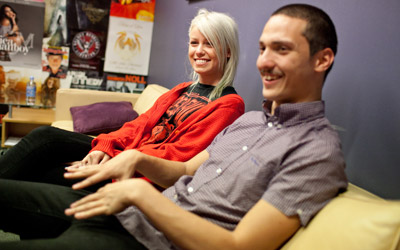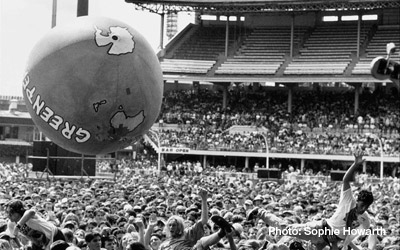14 December 2011
“We knew what we were and we just really, really, really, really wanted to cut the heads off of everybody, because of all the disbelief.”
It’s not easy for M. Shawn Crahan (aka Clown or #6) to speak of the events which lead to this conversation. Today is the Slipknot percussionist’s late father’s birthday, a day he usually tries to spend alone, “I try to make time for myself. Only children will know what I mean, if we don’t we will die.” But the month also coincides with the Anniversary Edition of Slipknot’s most infernal collection of metal fetor, the vortex that was Iowa.
Formed in Iowa in the late ‘90s, the nine-strong group’s rise to fame was almost immediate. Their 1999 debut went double-Platinum and the following four studio releases were all certified Platinum; but it was the sophomore record that defined an era for the group.
“I remember specifically living in that era,” says Crahan, 42. “We had no money and we had just gotten past the first record, there was a lot of talk, there was a lot of hype, but still no money.”
In the lead up to the recording of Iowa, Slipknot were treated like a product by their label and critics alike; much like the rubber masks the group painted, pulled and manipulated, they too were dragged across the globe with puppet strings tearing their weary limbs. Promotion and tour schedules hardly accommodated for sleep, a budget to eat, or the chance to develop their sound; most members battled drug addiction and inner demons that fueled chaotic live shows but burnt them from the inside out. So when Roadrunner Records pushed for an album of singles like Wait and Bleed, the band countered the request with an uncompromising second record.
“The whole thing was a threat, and because it became such a threat, it became a threat to ourselves,” Crahan’s emphasis on the word ‘threat’ highlights his understanding of the demons that shadowed the recording of the follow up. “When it got that deep and into it, then, wow,” he pauses, “it started getting dangerous.”
Released in August 2001 and named after the state that shaped them, Iowa went on to hit #2 on the ARIA Album chart and reach Platinum status - accolades that were met with neither surprise nor gratitude. “We cut everybody off, we cut the entire world off,” says Crahan. “We did exactly what we wanted to do and we went against the entire world.”
During this time, the group received minimal radio or MTV airplay. Crahan associates the exclusion with the economic cloud of fear that enveloped the nation after 9/11. “It was almost like people put blame on the way the world was acting, on something like us.” Despite this, Slipknot’s following had never been stronger. A demagogue for his christened army of ‘Maggots’, Crahan has created such an outlet for them over the band’s 16-year career it’s natural Slipknot have remained an impossible-to-top metal band in the 21st Century.
“It was like a way of life, almost like a cult,” he remembers. “It was just very frightening.”
The tour following Iowa’s release was financially no better than before, with nine incomes to furnish, Crahan was revolted against when he opted to pay videographer and personal mentor, Neil Zlozower to accompany them on the road and document the band.
“When I look back now on how hard it was to convince people, I mean people were mad.” But there is no escaping Crahan’s authority; as the founding member along with the late Paul Gray, Crahan notes, with that emergent, hypnotising tone, he had always foreseen the band’s success.
“I was always like, ‘look, I have my eye on the prize, I know what tomorrow is. It’s just far off and we’re gonna need this, you’ll see, you’re all gonna thank me later’.”
Most of the footage from that time can be seen on the band’s various documentaries including Crahan’s most recent work, Goat (included in the Iowa reissue). However, one seminal moment caught on camera was taped backstage after he cut his finger on the drums during a Conan O’Brien performance; it was never used due to moisture damage but Crahan relays the experience through a trance-like stream of consciousness, almost as if trying to relive it.
“We basically just gave everything we had into four or five minutes, like it was an entire show. We were completely exhausted sitting in this room, pondering the fact, did we do good (sic) on national TV or did we do bad? What just happened?
“And my son comes in...I had talked him into not being scared of my mask; ‘Look, see, Daddy’s just wearing a mask, it’s just a mask.’ And he’s looking at it and he’s touching it. You can tell he’s fascinated, he’s always fascinated, and I go ‘Look, Daddy cut his finger.’ He instantly pushes down on my wound as hard as he can,” Crahan pauses after each of the next six words, “and then he licked the blood. I looked at the cameraman and I go, ‘that’s my boy.’ I get this look, and my eyes turn into this thing.” The anecdote defines a time for Crahan, where the person he remembers is unrecognisable to him now. “Even my own son pushes down on my wound to make it hurt?” he asks himself. “But then makes it alright by licking my blood? Because he is of my blood. It’s just like, ‘What the hell?! Where are we?’”
In the early noughties, at the height of Slipknot’s success, Crahan was never unhappier. “It was very, very hard for me to watch myself in that era of my life. It was very disturbing.” Whilst piecing Goat together with Zlozower, Crahan says the biggest task wasn’t collating months of footage for an hour-long screening, it was facing the vice-stricken adult he used to be.
“I wasn’t exactly a kid, I was 32 years old,” he says. “I couldn’t watch how I was acting and how I am in that film.
“[Zlozower] had to convince me, almost beg me to leave in certain snippets of myself in there because I could barely watch myself. I can’t believe my demeanour and where my head is at.” Despite being viewed as a tight-knit brotherhood, they battled their inner hells alone, only cementing as a unit for live performances. “It takes me right back to that time, of how dark it was, and how out of our minds we were,” he stresses. “I can see it in my eyes, I can see it in my energy, in my body, my emotions.”
Crahan’s turmoil may have been clear to him but to the public, Slipknot were at a metal-trailblazing pinnacle. They had raised the bar to create a standard which still hasn’t been rivalled. When the group featured as cover stars on September 2001’s Rolling Stone, Crahan silently protested the industry feat.
“I’m like, screw you!” he says. “I’m unshaven, I closed my eyes and I put my arms up. It’s my way of saying to the world ‘well what do you expect? I got my picture on the Rolling Stone. Well I knew I would, didn’t you?!” he almost chuckles at the memory. “What? I gotta look into your face?”
Sadly, the following twelve months after that particular shoot were nothing to Crahan when compared to last year. Their upcoming Australian tour won’t feature a visible bassist - Paul Gray died of an overdose in a hotel room in May 2010 (interestingly, in his hometown where his wife and daughter were and still reside). For the most part, Crahan speaks as an evangelist from the ‘Church of Slipknot’, offering honest accounts of the band’s reckoning. Yet when asked about the death of Gray, he’s clearly still searching for answers.
“It’s not something that I can really understand yet. It goes deep with me,” he says. “I can hardly even fathom the idea of him passing away without knowing his child.” His wife was six months pregnant with daughter October when he died. “Knowing that you’re in love and that you’re having a baby, and then you die before you see it?” Crahan’s voice turns hoarse. “I mean shit, I can’t cope with that, I’m surprised I’m even sharing that with you.
“It’s the most hurtful thing of all time... He deserved to see his little girl and for whatever reason, fate did not work out that way and that to me is unfair,” he continues. “That makes life so circumstantial and random and I don’t like that. I have a hard time accepting that and I have a hard time wanting to be a part of that thought process.”
Slipknot embarked on The Memorial World Tour in June this year and the Paul Gray effigy featured onstage will adorn every show date, while past guitarist Donnie Steele will play Gray’s bass parts from behind a curtain.
“All of Europe, Russia, Australia and America will be a part of a grieving process, a part of that idea,” says Crahan. “Then I think our building blocks will start, I think it’s gonna take that long...But don’t be surprised if there’s still a picture of Paul Gray on a new album.”
In the lead up and aftermath of the re-issue, Slipknot have voluntarily relived a time when the courage to start a mutiny simultaneously built the group to monolithic proportions in the eyes of their Maggots but also deteriorated their hold on reality. A decade later, it also serves as a reminder to those who have supported them and those who have attempted to cross them.
“We’re not a band, we’re a culture, I don’t care whether people like to hear that or not. Some people in other bands don’t like that and I doubt it’s jealousy, but that’s part of why they didn’t make the culture,” says Crahan. “I have a culture, I am part of a culture. Sure, we’re a band I guess, but we’re a fuckin’ culture, get used to it.”
The Iowa 10th Anniversary Edition is out now through Roadrunner Records




















